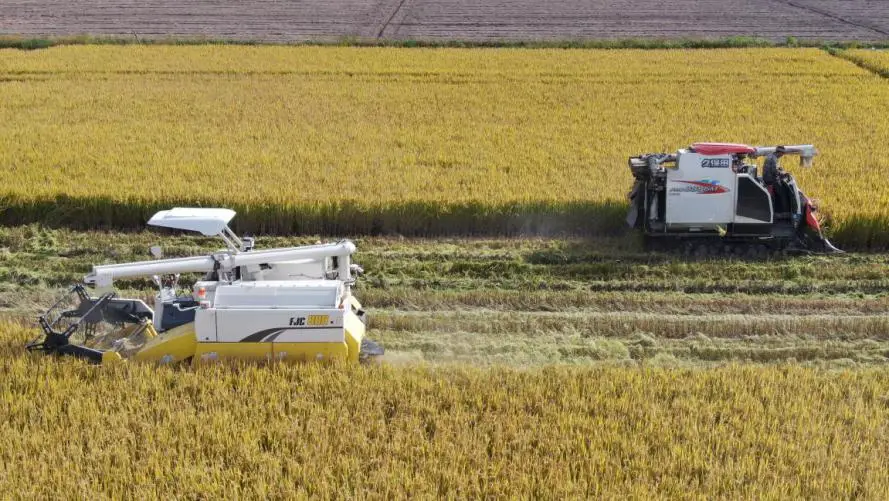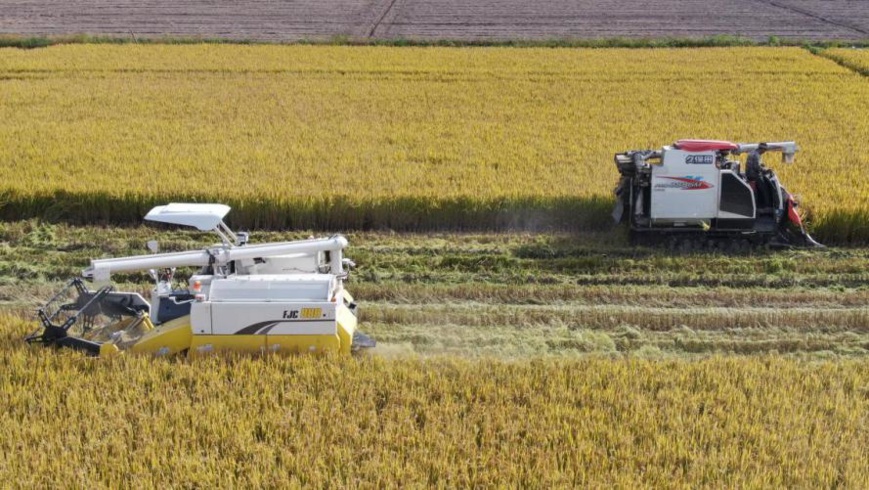By Bi Mengying, People’s Daily
Unmanned farm, where driverless tractors can cultivate land quickly and unmanned aerial variable rate fertilizer applicators can spray pesticides efficiently, is becoming a reality in China.
On March 9, an expo on preparation for spring farming held in Jingxia village, Huangpu district of Guangzhou, capital of south China’s Guangdong province, caught wide attention to unmanned smart agriculture practices including driverless agricultural machinery conducting farming activities and unmanned aerial vehicles (UAVs) performing tasks of plant protection accurately.
Huangpu district has been trying to empower and promote agricultural development with science and technology. Since the district has relatively less farmland, its pays greater attention to leveraging scientific and technological means to improve the quality and output of farm work.
The district has made great efforts to practice the strategy of innovative application of agricultural technology to increase farmland productivity. Regarding the use of scientific farming methods as an important measure to increase crop yield and people’s income, Huangpu district has endeavored to promote the commercialization and application of scientific and technological advances in a bid to increase the output per unit area and total output of grain.
In February, Huangpu district introduced research achievements in the development of unmanned farm of a research team led by Luo Xiwen, an academician with the Chinese Academy of Engineering (CAE), aiming to create an unmanned farm using 100 mu (about 6.67 hectares) of paddy fields in its Dajisha Island and find an effective solution to the problems of “who farms the land” and “how to farm the land” by realizing unmanned operations during the whole processes of farming activities from sowing, fertilization, pesticide spraying, to harvesting.
By promoting the development of unmanned farms, Luo’s team intends to liberate farmers from heavy manual labor and operators of agricultural machinery from laborious driving operation, Luo told reporters at the expo in Guangzhou.
As an approach to smart agriculture, unmanned farm features full coverage of all the production links from cultivation and management to collection of crops, full-automatic operation of machinery, automatic obstacle avoidance and shutdown in abnormal conditions, real-time monitoring of crop production process, and intelligent decision-making and unmanned accurate operation.
Unmanned farm can effectively improve the quality of farming activities, reduce production costs, increase the utilization rate of land, fertilizer, and pesticides, and realize all-day continuous operations.
Driverless tractors can finish soil preparation of 50 mu of land in three hours, a significant improvement in efficiency compared to manual labor. Meanwhile, if UAVs are used to ensure accurate fertilization, the yield of farmland will be raised by as much as 10 percent compared to that achieved through traditional fertilization methods.
Besides Guangzhou’s Huangpu district, other areas in China have also piloted unmanned farms. Such farms include the eco-friendly unmanned farm of Shandong University of Technology in Zibo, east China’s Shandong province, digital unmanned farm in Waigang township, Jiading district of east China’s Shanghai, as well as the Qixing farm in northeast China’s Heilongjiang province, with each having its own strengths.
Agricultural production needs to shift from labor-intensive models to technology-intensive models in the future, and to adapt to the change, agricultural producers should improve their scientific literacy and skills, Luo pointed out.
The improvement in productivity will also free some labor force from farming activities, Luo said, noting that these people wouldn’t be left jobless, as they can engage in auxiliary services such a repairing and maintenance of agricultural machinery and implements.
It’s believed that smart agriculture will witness new breakthroughs if unmanned farm can be popularized.
On March 9, an expo on preparation for spring farming held in Jingxia village, Huangpu district of Guangzhou, capital of south China’s Guangdong province, caught wide attention to unmanned smart agriculture practices including driverless agricultural machinery conducting farming activities and unmanned aerial vehicles (UAVs) performing tasks of plant protection accurately.
Huangpu district has been trying to empower and promote agricultural development with science and technology. Since the district has relatively less farmland, its pays greater attention to leveraging scientific and technological means to improve the quality and output of farm work.
The district has made great efforts to practice the strategy of innovative application of agricultural technology to increase farmland productivity. Regarding the use of scientific farming methods as an important measure to increase crop yield and people’s income, Huangpu district has endeavored to promote the commercialization and application of scientific and technological advances in a bid to increase the output per unit area and total output of grain.
In February, Huangpu district introduced research achievements in the development of unmanned farm of a research team led by Luo Xiwen, an academician with the Chinese Academy of Engineering (CAE), aiming to create an unmanned farm using 100 mu (about 6.67 hectares) of paddy fields in its Dajisha Island and find an effective solution to the problems of “who farms the land” and “how to farm the land” by realizing unmanned operations during the whole processes of farming activities from sowing, fertilization, pesticide spraying, to harvesting.
By promoting the development of unmanned farms, Luo’s team intends to liberate farmers from heavy manual labor and operators of agricultural machinery from laborious driving operation, Luo told reporters at the expo in Guangzhou.
As an approach to smart agriculture, unmanned farm features full coverage of all the production links from cultivation and management to collection of crops, full-automatic operation of machinery, automatic obstacle avoidance and shutdown in abnormal conditions, real-time monitoring of crop production process, and intelligent decision-making and unmanned accurate operation.
Unmanned farm can effectively improve the quality of farming activities, reduce production costs, increase the utilization rate of land, fertilizer, and pesticides, and realize all-day continuous operations.
Driverless tractors can finish soil preparation of 50 mu of land in three hours, a significant improvement in efficiency compared to manual labor. Meanwhile, if UAVs are used to ensure accurate fertilization, the yield of farmland will be raised by as much as 10 percent compared to that achieved through traditional fertilization methods.
Besides Guangzhou’s Huangpu district, other areas in China have also piloted unmanned farms. Such farms include the eco-friendly unmanned farm of Shandong University of Technology in Zibo, east China’s Shandong province, digital unmanned farm in Waigang township, Jiading district of east China’s Shanghai, as well as the Qixing farm in northeast China’s Heilongjiang province, with each having its own strengths.
Agricultural production needs to shift from labor-intensive models to technology-intensive models in the future, and to adapt to the change, agricultural producers should improve their scientific literacy and skills, Luo pointed out.
The improvement in productivity will also free some labor force from farming activities, Luo said, noting that these people wouldn’t be left jobless, as they can engage in auxiliary services such a repairing and maintenance of agricultural machinery and implements.
It’s believed that smart agriculture will witness new breakthroughs if unmanned farm can be popularized.
 Menu
Menu
 Unmanned farm projects boost development of smart agriculture in China
Unmanned farm projects boost development of smart agriculture in China

















